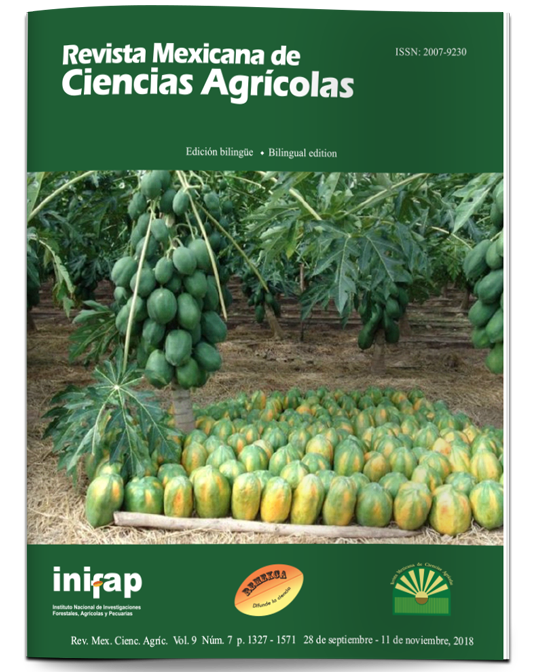Physiological and biochemical affectations in vitroplants of sugarcane in response to hydric and saline stress
DOI:
https://doi.org/10.29312/remexca.v9i7.1253Keywords:
Saccharum, abiotic stress, high resolution liquid chromatographyAbstract
The agricultural production is negatively affected by biotic and abiotic stress, being responsible for great economic losses in the world. Sugarcane is the raw material for obtaining cane juice that is transformed into sucrose and the production of second generation ethanol. In the present study, the number of buds and leaves, the concentration of proline, chlorophyll a, b and total and the concentration of sugars in response to hydric and saline stress in two varieties of sugarcane in vitro were evaluated. Individualized buds of 5 cm in length of the MotzMex 91-207 and SP 71-6180 varieties of sugarcane were cultivated in vitro under water stress (PEG 6000) and saline (NaCl). The two varieties of sugar cane analyzed in vitro presented different responses to osmotic stress. The variety MotzMex 91-207 was better than the variety SP 71-6180 to respond to water stress with a greater accumulation of proline (82.34 mg g-1 PS), did not present decrease in the chlorophyll a, b and total content and generated 20.8 buds per explant even under stress conditions. On the other hand, the response to salt stress with 50 mM NaCl in vitro was presented by the variety SP 71-6180, generating a greater accumulation of carbohydrates such as galactose, glucose and mannose.
Downloads
Downloads
Published
How to Cite
Issue
Section
License
The authors who publish in Revista Mexicana de Ciencias Agrícolas accept the following conditions:
In accordance with copyright laws, Revista Mexicana de Ciencias Agrícolas recognizes and respects the authors’ moral right and ownership of property rights which will be transferred to the journal for dissemination in open access. Invariably, all the authors have to sign a letter of transfer of property rights and of originality of the article to Instituto Nacional de Investigaciones Forestales, Agrícolas y Pecuarias (INIFAP) [National Institute of Forestry, Agricultural and Livestock Research]. The author(s) must pay a fee for the reception of articles before proceeding to editorial review.
All the texts published by Revista Mexicana de Ciencias Agrícolas —with no exception— are distributed under a Creative Commons License Attribution-NonCommercial 4.0 International (CC BY-NC 4.0), which allows third parties to use the publication as long as the work’s authorship and its first publication in this journal are mentioned.
The author(s) can enter into independent and additional contractual agreements for the nonexclusive distribution of the version of the article published in Revista Mexicana de Ciencias Agrícolas (for example include it into an institutional repository or publish it in a book) as long as it is clearly and explicitly indicated that the work was published for the first time in Revista Mexicana de Ciencias Agrícolas.
For all the above, the authors shall send the Letter-transfer of Property Rights for the first publication duly filled in and signed by the author(s). This form must be sent as a PDF file to: revista_atm@yahoo.com.mx; cienciasagricola@inifap.gob.mx; remexca2017@gmail.
This work is licensed under a Creative Commons Attribution-Noncommercial 4.0 International license.



